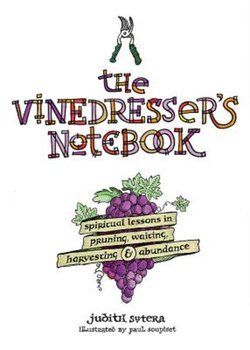Читать книгу The Vinedresser's Notebook - Judith Sutera - Страница 5
На сайте Литреса книга снята с продажи.
ОглавлениеTO BE A BEGINNER IS HUMBLING. Everything seems so overwhelming and confusing. If there are others already doing it, it can be even more threatening as we compare ourselves to them and fear their judgment or ridicule. We feel watched, awkward, helpless, afraid, stupid—and any number of other feelings.
Sometimes we’re asked, or told, to do things we’ve never done before. It may not be something we would have wanted to do or imagined doing or believed we could be good at doing. We never want to appear ignorant or incompetent—but if we act from our fear of seeming ignorant, we will never begin anything new.
When I first started vinedressing I was given some things to read. I read the extension bulletins and some gardening books and learned some general things about pruning and possible problems and such. Of course, books are useful companions when one embarks on something new (and in the spiritual life, they are useful companions all the way through). But as I read my way into vinedressing, I began to realize how much had to come from hands-on work and a good flesh-and-blood teacher. I really came to appreciate being with someone who had more experience and knowledge. Even more important than what is learned is making the deep connection with a person who actually cares about you, listens to you, and answers your questions.
In the spiritual realm, it seems to be especially important not to trust ourselves—to seek the insights of another who might be more experienced than we and who might look at us with both love and distance. Whether we call them spiritual directors, gurus, confessors, masters, or whatever, there are wise and holy people in all faith traditions to whom others are drawn. They draw others not as much by their preaching as by the sanctity of their own lives, the goodness that comes through them and by which others are touched and transformed.
When many early Christian people went to the desert to seek holiness, the tradition was that every person would find an abba or amma (spiritual father or mother) who would help him or her find the path for his or her life. In many faith traditions, one seeks wisdom from the word given by a person believed to have greater wisdom and insight than that which the seeker currently possesses. The Zen master, the amma, the rabbi, or whoever, often tells a story rather than gives a lecture. These stories take us beyond gathering mere information and show us how to live. They shape our experience into a quiet teaching.
Because of the way my mentor saw everything as a metaphor and all life as reflective of the same truths, I learned to see the plants the way she did. We were never just looking at vines. When she spoke about them, she sounded as if they were friends, and she cared for them that way. That alertness and caring taught me to pay attention to more than the basic techniques I got from the books and helped me to turn the techniques into something personal and instinctive. I started really looking at them and listening to what they were trying to tell me. When I saw something I didn’t understand or hadn’t seen before, she was always there to pass on what she knew from her many years with them (or suspected from a broader base of reference). Everyone needs a teacher, someone who knows the landscape and can take him or her into the vineyard at first.
